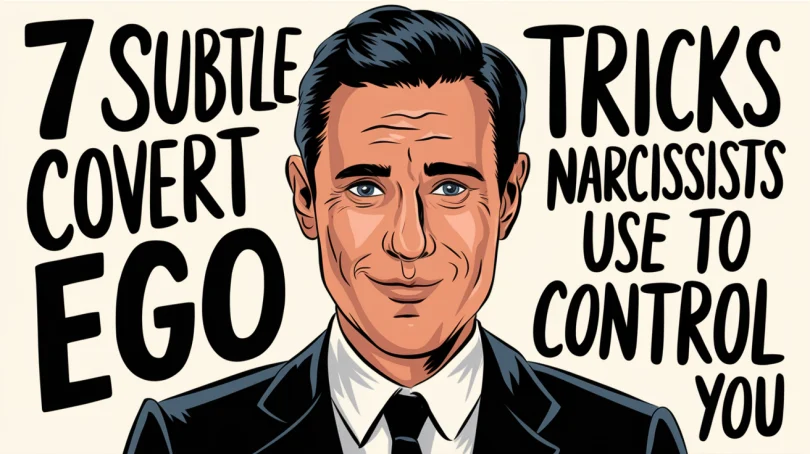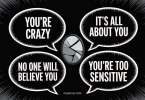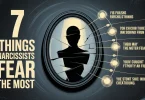Today, I wanted to shine the light on seven subtle characteristics or habits that covert narcissists engage in. And yes, I want to focus on the covert narcissist because the overt narcissist is the obvious narcissist we’re familiar with, right? There’s so much information now. We know about the gaslighting, we know to watch out for the love bombing, and we understand these obvious habits that overt narcissists engage in.
But the covert narcissist is like a breed of its own, and I kind of liken covert narcissist manipulation to emotional carbon monoxide. Right? It seems virtually undetectable, and yet it’s deadly. Now, there are ways to detect carbon monoxide, and there are ways to detect covert narcissists, and so that’s what we’re going to focus on today. But that’s not all because, guess what? Knowing even these subtle habits or characteristics of narcissists is not enough to make sure that you never get sucked into a relationship with one.
Number one is one that I’ve talked about in the past, but it’s the smirk.
It’s when a narcissist does something, says something that isn’t quite pleasant, that doesn’t make you feel good, and yet they might respond verbally that they’re joking, and yet it’s accompanied with this smirk. It’s not a full smile; it’s not done with both sides of the mouth. It’s usually just one side of the mouth curled up. And so, again, they may have been testing your boundaries.
They may have caused you to feel hurt or shame subtly. They may have done or said something that caused you or provoked in you the emotion of shame, and then they respond verbally with, “I was just kidding,” and there’s the smirk. Usually, when somebody is just joking and they’re feeling bad that they hurt you, and they say, “Oh, I was just kidding; I didn’t mean to hurt you,” you feel the genuineness of their words.
Related Topics:
Best Responses to a Covert Narcissist’s Emotional Attacks?
9 ways to deal with toxic people
Do This to Psychologically Make Someone Like You
Top 5 Overlooked Dating Red Flags
10 Reasons Narcissists Cut You Off Abruptly
But with a narcissist, when those words are accompanied by a smirk, it doesn’t feel right. And what sadly tends to happen is we start questioning ourselves like, “Oh, am I just being oversensitive? They’re apologizing; why don’t I still feel good?” And we may start blaming ourselves for not feeling okay when the reality is that smirk is usually the narcissist’s way of feeling proud of themselves for being able to provoke a disempowering emotion in you. It’s almost like their own inner high-five that comes creeping out of the corner of their mouth. So, something to look for. Let me know below if you’ve noticed this one and how and when it’s come up in your life.
Number two is their tone of voice, along with a parental, condescending way of speaking to you.
What I mean by that is their tone of voice may sound as if they care; it may sound sweet. No anger or maliciousness is sounding in the tone of voice, but the way that they’re talking to you feels almost like a parent trying to control a child and not in a loving way.
They might criticize something about you but sound nice and then end the criticism with, “You know, it’s only because I care.” Like, there’s that parental, “I’m telling you this to help you.” As nice as the words sound, it doesn’t feel good because the ultimate motive behind it isn’t really to help you; it’s to make sure you feel shame in some way, shape, or form. And the fact that you feel it causes them to feel good about what they just did and said.
It’s one of those things where you’re left confused. Like, maybe the tone of voice was seemingly kind, interested in helping you, but somehow it just didn’t feel good. It provoked more shame than support, right? So, they combine their tone of voice this overly flattery, over-the-top way of trying to sound sweet almost to mask the poison underneath them.
Number three is their subtle, heavy, negative energy that they deny having.
This is kind of like the silent treatment done with grace. In other words, the silent treatment with an overt narcissist comes out of anger. You’re in a fight, right? And the narcissist punishes you with this obvious way of, “I’m going to pretend you’re dead; I’m going to treat you like you’re dead.” The covert narcissist? It doesn’t escalate to a fight.
It might just be that you pointed out something in the narcissist that you didn’t like. Maybe they hurt your feelings, right? And it’s normal to say, like, “Hey, when you do or say this, it hurts me.” In response, the narcissist has this demeanor change. They’re not talking to you.
When you ask them if everything’s okay, they verbally say, “Everything’s fine,” but you can feel the energy, right? You can cut the thickness of that heavy energy with a knife. And so, you’re left with them saying everything’s fine, but it doesn’t feel fine.
So, again, there’s that subtle gaslighting, but done in such a way that causes you to start thinking, “Well, am I making a problem out of nothing? You know, they’re saying they’re fine; maybe it’s just me. Why am I? Maybe they’re just quiet; maybe they had a bad day.” You start getting into the habit of making excuses for this bad behavior.
Number four is playing the victim when they are creating the problem.
Now, I’m going to give you an example to paint a picture with this one. This happened in a relationship I was in with somebody that I feel is high on the scale of covert narcissism. And every time we would go out in a group, this person would absolutely, completely ignore me to the point that it would just feel weird.
I would have other friends tell me, “Why are they putting a wall around you? It’s like you’re not there.” So, it was something obvious to me, and at that time, it was obvious to some of my friends. And so, when I mentioned it to this other person, they were like, “Why would you think that? Like, I would never do that.
It hurts my feelings that you would even accuse me of something like that.” And then they would proceed to say, “You know, it makes me uncomfortable. I’m scared to be around you in groups now. Like, I have to walk on eggshells because I’m just trying to be myself, but you’re finding problems in things that aren’t even happening.” Now, when you don’t understand covert narcissism and you’re in a relationship with somebody that says that, your first thought is to start questioning yourself like,
“Oh my God, like, am I doing that? Am I creating a problem where one doesn’t exist? Am I being overly sensitive? Is it me? Maybe I’m not engaging in the conversation like they said, even though when I do, they ignore me, but maybe it’s still me.” So, again, all of these subtle forms of being I hope you’re noticing by now are designed to cause you to subtly begin doubting yourself, not trusting your reality, not trusting your perspective.
Number five, I call “the pause.”
And what I mean by that is when you’re having a disagreement or even just sharing different perspectives with someone, it’s normal for one person to share their perspective and the other person to then share their perspective. And even if they’re different, there’s that moment where you try to understand why the other person sees it the way they do.
Doesn’t mean you’re going to agree with it, but you do your best to understand their perspective. Well, in conversations with narcissists, even in everyday conversations, they don’t even have to be disagreements. You’ll find that your perspective is like it’s never even heard. When you look at how a narcissist listens, it’s just a pause.
So, for example, they’ll share their perspective, and then as you share yours, they do stop talking. So, this is their way of saying, “Look, I listen.” But if you pay attention to what happens when you stop talking, you’ll notice that the narcissist picks up right where they left off, as if your perspective doesn’t even exist.
Number six is being overly agreeable yet never supportive.
Now, what I mean by this is in a narcissistic relationship, one of the weirdest or craziest things that happens with a covert narcissist is how much you begin changing, and yet the person never said that you had to change. So, let me give you another example just to bring this one home as well.
So, in my case, I completely stopped reading. Now, did that person ever, ever say, “Stop reading; you shouldn’t read; it’s bad to read”? No. If I would share my passions “Oh, I love to read; I love this; I love doing that” it was always met with this agreeable, “Oh, that’s awesome; that’s great.” But then, when I would do the things that I love, it would be at that moment where there would be an argument, or I would get this weird glare, right? That was meant to make me well, it did make me stop in my tracks and analyze, “Am I doing something bad? Am I doing something wrong?” And it would wake up this thing inside of me that was like, “Oh, I need to go do something, something.
Forget about enjoying my time; I need to be doing something.” In the end, the narcissist never said to not do that, but they create a negative energy around every single time you engage in the things you love so that subconsciously, it’s like they’re going right in the back door and making you feel as if what you’re doing is bad. They’re not saying it’s bad; they’re making you feel.
They’re implying with their energy. And with time, your body starts to feel uncomfortable doing the things you love. So, it’s so subtle. They say, ‘Go do it,’ but when you do it, it’s so miserable, it’s so negative, that your body gets the message to not do it.
Number seven is provoking you behind closed doors.
So, let’s say you’re going out; you’re going to meet up with friends or family later on in the day. Right before the event, the narcissist will say something that provokes shame in you, and it usually happens at a moment when you think everything is fine. So, it takes you off guard, and then suddenly, you’re thrust into this group setting without having the time to digest and understand what just happened. When you’re around people, you’re feeling unsettled; you’re feeling anxious; you’re feeling insecure and confused.
The narcissist is shining like a diamond. Whoever they were showing themselves to be right before the event is a complete change from who they show up as around everyone. And so, now you’re around people; you’re upset at how you’re being treated, and now you’re being told by everyone else how amazing your significant other or your friend is.
“They’re just amazing,” because now they’re love-bombing everyone else, right? So, while the overt narcissist works to isolate you in more overt ways by criticizing your family and your friends, the covert narcissist will create situations that allow you to be around people you love, but they will make it impossible for you to enjoy it. You’re so focused on what they did or said right before the event that you can’t even enjoy the time and the connections with healthy people.
So, those are seven subtle characteristics or habits that covert narcissists usually engage in. I’d love to know how many you’ve spotted in your life. But as I’m talking, I just came up with two that I want to share with you. two subtle signs in you that you might be in a relationship with a covert narcissist.
The first one is this need for this impulse to work harder as the relationship starts to crumble. So, what I mean by that is that covert narcissists take you on a roller coaster. They bring you so high up; it is so amazing, but only to fall so low down that it is an absolute nightmare. This often wakes up this impulse to do whatever we can to stay in that upswing of things, and without realizing it, we start tolerating unhealthy, toxic behavior without even realizing it. This is an unconscious thing that starts to take place.
We’re going to get more into that soon in the second part of this video, but that is one subtle sign in you. When somebody is grounded in themselves, and their unhealed trauma from the past is not being activated in their body, and they start to be mistreated, rather than trying harder, they put boundaries down, right? But if something deeper is going on beneath the surface, we try harder. So, that’s something to look for in yourself.
And then the other thing is confusion. One of my guilty pleasures is watching reality shows like Married at First Sight and Love is Blind. I love them to death. But I remember many seasons ago, it was Married at First Sight, and there was a couple, and you could see the things that he was doing to devalue her, to then pull her in and make her feel special, to spit her out and make her feel awful.
Like, you could see the manipulation plain as day. And one day, she just says out loud, out of nowhere, she’s like, “I feel like I don’t even know who I am anymore.” So, what are the subtle signs in you that you might be with a covert narcissist? It’s that you start losing touch with who you know yourself to be. You start questioning, “Like, who am I? Why am I like this? I am changing.” That’s a real big sign that you’re being manipulated.
d now you’re immune to a narcissist,” is lying. The healing does take time, but if you do it, and the patterns are no longer in you, guess what? You won’t get sucked into them by someone else either. So, it is hard work, but it is so worth it.






